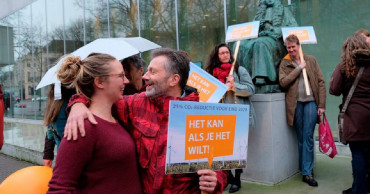Climate activists
German climate activists pledge new wave of blockades
Climate activists said Tuesday that they will stage further protests in Berlin in an effort to force the German government into doing more to curb global warming.
The announcement came as courts are taking a tougher stance against members of the group Last Generation who have repeatedly blocked roads across Germany in the past year.
The group said at a news conference in Berlin that it would begin to stage open-ended protests Wednesday in the government district. From Monday onward, members will try to “peacefully bring the city to a standstill,” it said.
Last Generation accuses the German government of breaching the country’s constitution, citing a supreme court verdict two years ago that found too much of the burden for climate change was being placed on younger generations. The government under then Chancellor Angela Merkel subsequently raised its targets for cutting greenhouse gas emissions, but activists say the measures aren’t consistent with the Paris climate accord.
“As long as there’s no plan we can trust to protect our lives and future, and that’s based on the constitution, we are obliged to demand such a plan with all peaceful means,” said Carla Hinrichs, a spokesperson for Last Generation.
The group wants Germany to end the use of all fossil fuels by 2030, a step that would be extremely ambitious to achieve. The country switched off its last three nuclear plants over the weekend, increasing its reliance on coal and gas-fired power plants until sufficient renewable energy capacity is available.
Last Generation’s protests have drawn sharp criticism from across much of the political spectrum, though there has also been support for their underlying aims.
Three activists were sentenced to between three and five months imprisonment by a court in the southwestern city of Heilbronn on Monday. The judge noted that they had joined a blockade in March hours after being sentenced in a previous case.
One of the protesters, Daniel Eckert, defended his actions after the verdict, saying: “As long as the true criminals aren’t brought before a court but instead continue to destroy the basis of our existence and profit from it, I can’t do anything other than stand in the way of this destruction.”
2 years ago
German coal mine clash pits laws against climate
The fate of a tiny village has sparked heated debate in Germany over the country’s continued use of coal and whether tackling climate change justifies breaking the law.
Environmental activists have been locked in a standoff with police who started eviction operations on Wednesday in the hamlet of Luetzerath, west of Cologne, that’s due to be bulldozed for the expansion of a nearby lignite mine. Some stones and fireworks were thrown at officers in riot gear, who could be seen dismantling stalls set up by protesters.
Protesters refused Tuesday to heed a court ruling effectively banning them from the area. Some dug trenches, built barricades and perched atop giant tripods in an effort to stop heavy machines from reaching the village, before police pushed them back by force.
“People are putting all of their effort, all of their lives into this struggle to keep the coal in the ground,” said Dina Hamid, a spokesperson for the activist group Luetzerath Lives.
“If this coal is burned, we’re actually going to take down our climate goals,” she said. “So we’re trying to, with our bodies, protect the climate goals.”
The debate flared up hours later at a townhall meeting in nearby Erkelenz, when one regional official accused activists of being willing to “spill human blood” to defend the now-abandoned village.
Also Read: Climate activists dig in to defend village from coal mine
Stephan Pusch, who heads the district administration, said that while he sympathized with the protesters’ aims, the time had come to give up Luetzerath. The village’s last resident left in 2022 after being forced to sell to utility company RWE.
“You’ve achieved your goal. Now clear the pitch,” he said to jeers from the room.
Many disagreed, arguing that the village is more than just a potent symbol for the need to stop global warming.
Studies indicate that about 110 million metric tons of coal could be extracted from beneath Luetzerath. The government and RWE say this coal is needed to ensure Germany’s energy security — squeezed by the cut in supply of Russian gas due to the war in Ukraine.
Critics counter that burning so much coal would make it much harder for Germany, and the world, to cap global warming at 1.5 degrees Celsius (2.7 Fahrenheit) as agreed in the 2015 Paris climate accord.
“Nobody wants to be out there in the cold right now, defending a forest or a village,” said Maya Rollberg, a 26-year-old student who had traveled from southern Germany. “But I think that people have realized that they have to do that in order to (protect) future generations.”
Dietmar Jung, a retired priest attending the meeting, said he was tired of hearing officials say the law was on the side of RWE.
“They keep going back to the legal situation,” he said. “But the right to live doesn’t play a role here (for them).”
Pusch, the regional administration chief, warned protesters that intentionally breaking the law wouldn’t help their cause in a country where the violent seizure of power and the horrors of dictatorship are still within living memory.
“I’ll tell you honestly that I’m scared my children will grow up in a world that isn’t worth living in anymore,” he said. “But I’m at least as scared of my children growing up in a country where everyone takes the law into their own hands.”
“You won’t save the world’s climate on your own,” said Pusch. “(We’ll) only do so if we manage to take the majority of the population with us.”
Similar debates over how far civil disobedience can go have taken place in Germany and elsewhere in recent months amid a wave of road blockades and other dramatic actions by protesters demanding tougher measures to combat climate change.
Some climate activists say the law is ultimately on their side, citing a 2021 ruling by the country’s supreme court that forced the government to step up its effort to cut emissions. They also note the legally binding nature of Germany’s commitments under the Paris accord.
Speaking after the townhall meeting, student Jannis Niethammer acknowledged that the dispute over Luetzerath touches on fundamental issues. “It’s a question of democracy and how do we actually get a democracy to move toward climate protection, toward climate justice,” he said.
Janine Wissler, a federal lawmaker and co-leader of the opposition Left party, suggested the way out would be for the government to reverse its decision allowing the village to be razed.
“If we want to achieve our climate targets and take the Paris climate agreement seriously, then the coal beneath Luetzerath needs to stay in the ground,” she told The Associated Press on the sidelines of the protest.
Wissler criticized an agreement struck last year between the government and utility company RWE to permit mining beneath the village in return for an earlier end to coal use in Germany. Some experts say that, in sum, the deal will lead to higher emissions.
“We’re already experiencing droughts, famines and floods. Climate change is happening already,” she said. “And therefore wrong decisions need to be corrected.”
3 years ago
Climate activists try to block access to 3 German airports
Climate activists on Wednesday blocked roads leading to Germany's three biggest airports, gluing themselves to the ground before police arrived.
Members of the group Uprising of the Last Generation said they wanted to disrupt cargo and passenger traffic at the airports in Frankfurt, Munich and Berlin.
Read:French, German leaders to visit Russia, Ukraine amid tension
The group has demanded that the government should take measures to end food waste. It argues that throwing away vast amounts of usable food contributes to hunger and climate change.
Past protests involving the blocking of roads and ports have drawn criticism from officials across the political spectrum.
The blockades are reminiscent of the protests last year by the climate action group Insulate Britain, which obstructed many main highways and roads in the U.K.
4 years ago
COP26: Young people urged to raise voice to save planet
State Minister for Foreign Affairs M Shahriar Alam has called upon the young people and climate activists of Bangladesh and the UK to join hands and emerge as the greatest force for good for their respective countries in protecting the planet.
He urged them to raise their voices at the COP26 and beyond, and be an asset to their local communities in saving the planet, people and nature for succeeding generations. "There is no planet B or plan B."
Read Dhaka, London hopeful of signing climate accord before COP26
The State Minister was addressing a youth climate dialogue titled "Bangladesh-UK Youth Voices on Climate Action: The Road to Glasgow" held virtually on Friday night.
4 years ago
Climate activists get final victory in Dutch court ruling
Climate activists won a final victory Friday in their long-running battle through Dutch courts to force the government to cut greenhouse gas emissions.
6 years ago







